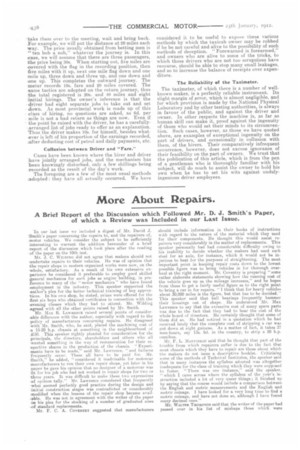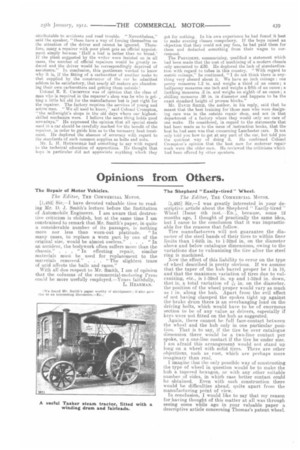More About Repairs.
Page 16

Page 17

If you've noticed an error in this article please click here to report it so we can fix it.
A Brief Report of the Discussion which Followed Mr. D. J. Smith's Paper, of which a Review was Included in our Last Issue.
"In our last issue we included a digest of Mr. David J. Smith's paper concerning the repairs to, and the repairers of, enotor vehicles. We consider the subject to be sufficiently interesting to warrant the addition hereunder of a brief report of the discussion which took place after the reading of the paper on the 10th inst. Mr. .T. C. WILDING did not agree that makers should not andertake repairs to their vehicles. He was of opinion that the repair shops in modern organized works were now, on the whole, satisfactory. As a result of his own extensive experience he considered it preferable to employ good skilled general mechanics for such jobs as engine building, in preference to many of the "motor mechanics" who have found employment in the industry. This speaker supported the author's plea for the better technical training of boy apprentices. In his own shop, he stated, prizes were offered for the first six boys who obtained certificates in connection with the evening classes which they had to attend. Mr. Wilding agreed with all the other points raised by Mr. Smith. Mr. Max R. LAWRENCE raised several points of considerable difference with the author, especially with regard to the policy of manufacturers concerning repairs. He disagreed with Mr. Smith, who, he said, placed the machining cost of 2 15-20 h.p. chassis at something in the neighbourhood of This speaker rightly pleaded for consideration for the principals, the directors, shareholders and others who all wanted something in the way of remuneration for their respective shares in the production of the chassis. " Experiments have to be made," said Mr. Lawrence, "and failures frequently occur. These all have to be paid for. Mr. Smith," he added, "considered it inadvisable for motorcar manufacturers to run their own repair shops, yet later in his paper he gave his opinion that no designer of a motorcar was for his job who had not worked in repair shops for two or three years. It was difficult to make these two expressions of opinion tally." Mr. Lawrence considered that frequently what seemed perfectly good practice during the design and initial construction stages was contradicted or considerably modified when the lessons of the repair shop became available. He was not in agreement with the writer of the paper in his plea for the stocking of a number of graduated sizes of standard replacements. Mr. F. C. A. COVENTRY suggested that manufacturers
should include information in their books of instructions with regard to the nature of the material which they used for their components. He thought this would assist repairers very considerably in the matter of replacements. This speaker personally had had considerable difficulty owing to his inability to decide whether the makers had used such steel for an axle, for instance, which it would not be injurious to heat for the purposes of straightening. The most important point in keeping repair costs down to the lowest possible figure was to bring vehicles in for thorough overhaul at the right moment. Mr. Coventry is preparing "some rather elaborate statements showing how the running cost of the vehicle goes up as the mileage increases," and he h.:Tea from these to get a fairly useful figure as to the right point to bring a car in for repairs. " I think that for heavy vehicles about 30,000 miles is the figure, but that has to be decided." This speaker said that ball bearings frequently hammer their housings out of shape. He understood Mr. Max Lawrence to say that the excessive cost of many spare parts was due to the fact that they had to bear the cost of the whole beard of directors. He certainly thought that some of them did so. He had noticed in a quotation which he had received lately that the complete cost of stripping a car was put down at eight guineas. As a matter of fact, it takes 27 men-hours, say 13s. 6d. in the country, to strip a 20 h.p. omnibus.
Mr. F. L. Morrisciu said that he thought that part of the trouble from which repairers suffer is due to the fact. that most chassis which they have to repair are those about which the makers do not issue a descriptive booklet. Criticising some of the methods of Technical Institutes, the speaker said that in many instances the syllabus adopted was altogether inadequate for the class of training which they were supposed to foster. "There was one instance," said the speaker, " which I came across where the syllabus of the year's instruction included a lot of very queer things; it finished up by saving that the course would include a comparison between the gnglish and metric measurements and the English and metric coinage. I have looked for a very long time to find a metric coinage, and have not done so, although I have found many decimal ones." Mr. WALTER THOMPSON said that the writer of the paper had passed over in his list of mishaps those which were attributable to accidents and road trouble. " Nevertheless," said the speaker, " these have a way of forcing themselves On the attention of the driver and cannot be ignored. Therefore, many a repairer with poor plant gets an official appointment simply because ' Half a loaf is better than no bread.' If the plant suggested by the writer were insisted on in all cases, the number of official repairers would be greatly reduced and the driver would be correspondingly deprived of assistance." In conclusion, this gentleman wanted to know why it is, if the fitting of a carburetter of another make to tha7t supplied by the constructor of the car be admitted seldom to be satisfactory, that nearly all makers are abandoning their own carburetters and getting them outside':
Colonel R. E. CROMPTON was of opinion that the class of man who is required in the repairer's shop was he who is getting a little bit old for the manufacturer but is just right for the repairer. The factory requires the services of young and active men. " We all used to know," said Colonel Crompton, " the millwright's shops in the old days where our highestskilled mechanics were. I believe the same thing holds good nowadays." He expressed the opinion that all special steels used in a car should be carefully marked for the benefit of the repairer, in order to guide him as to the necessary heat treatment. lie deplored the absence of accuracy with regard to the standards of such common supplies as bolts and nuts.
Mr. L. H. HOONSEIELD had something to say with regard to the technical education of apprentices. He thought that boys in particular did not appreciate anything which they
got for nothing. In his own experience he had found it beat to make evening classes compulsory. If the boys raised an objection that they could not pay fees, he had paid them for them arid deducted something from their wages to correspond.
The PRESIDENT, summarizing, qualified a statement which had been made that the cost of machining of a modern chassis only amounted to £30. Ile deplored the lack of standardization with regard to tubes in this country. "With regard to metric coinage," he continued, "I do not think there is anything very absurd about it. We have an inch coinage : one penny measures L2 in. and weighs a third of an ounce; a halfpenny measures one inch and weighs a fifth of an ounce ; a farthing measures .8 in. and weighs an eighth of an ounce; a shilling measures .98 in. in diameter and happens to be the exact standard height of process blocks."
Mr. DAVID SMITH, the author, in his reply, said that he meant that the best training for those men who were designing cars was in the outside repair shop, and not in that department of a factory where they would only see cars of one make. He considered, in regard to the statements that had been made as to the issue of instruction books, that the best he had seen was that concerning Lanchester cars. It not only told you how to get at any part of the car, but told you the quickest way of doing it. He confirmed Colonel Crompton's opinion that the best men for motorcar repair work were the older men. He reviewed the criticisms which had been offered by other speakers.






















